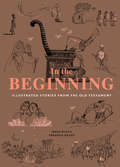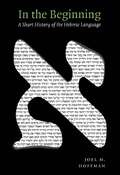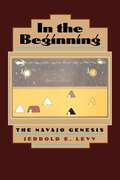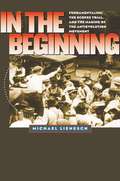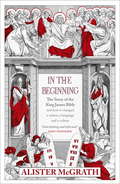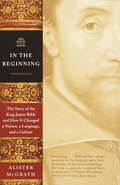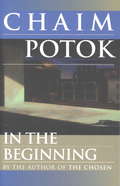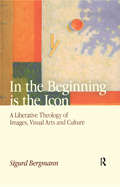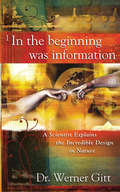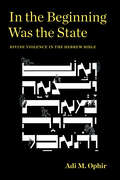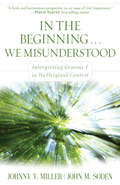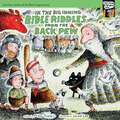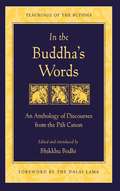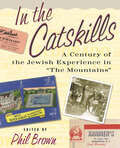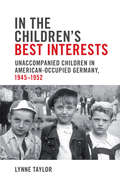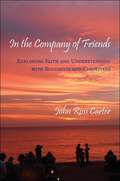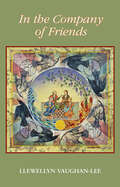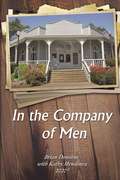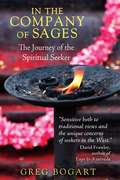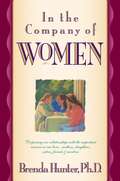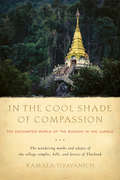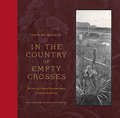- Table View
- List View
In the Beginning: Illustrated Stories from the Old Testament
by Frederic BoyerFrom Genesis to the Book of Daniel, this ebook recounts 35 stories from the Old Testament in a modern and inviting way, combining spirited illustrations with spare, eloquent prose. Acclaimed illustrator Serge Bloch expertly captures the many scenes in these beloved tales, conveying extraordinary breadth of emotion and action in his seemingly simple drawings. Biblical expert Frédéric Boyer and poet and translator Cole Swensen contribute accessible and enlightening text, further illuminating the stories with notes on their history and symbolism. Full of contemporary resonance, here are universal stories of love, anger, betrayal, faith, and courage—revealed in a way that encourages readers of all ages and faiths to engage with them anew.
In the Beginning: A Short History of the Hebrew Language
by Joel HoffmanDecodes the long history of Hebrew and its influential place as the ancestor of many modern written languagesHebrew as a language is just over 3,000 years old, and the story of its alphabet is unique among the languages of the world. Hebrew set the stage for almost every modern alphabet, and was arguably the first written language simple enough for everyone, not just scribes, to learn, making it possible to make a written record available to the masses for the first time. Written language has existed for so many years—since around 3500 BCE—that most of us take it for granted. But as Hoffman reveals in this entertaining and informative work, even the idea that speech can be divided into units called “words” and that these words can be represented with marks on a page, had to be discovered. As Hoffman points out, almost every modern system of writing descends from Hebrew; by studying the history of this language, we can learn a good deal about how we express ourselves today.Hoffman follows and decodes the adventure that is the history of Hebrew, illuminating how the written record has survived, the significance of the Dead Sea Scrolls and ancient translations, and attempts to determine how the language actually sounded. He places these developments into a historical context, and shows their continuing impact on the modern world.This sweeping history traces Hebrew's development as one of the first languages to make use of vowels. Hoffman also covers the dramatic story of the rebirth of Hebrew as a modern, spoken language.Packed with lively information about language and linguistics and history, In the Beginning is essential reading for both newcomers and scholars interested in learning more about Hebrew and languages in general.
In the Beginning: The Navajo Genesis
by Jerrold E. LevyJerrold E. Levy's masterly analysis of Navajo creation and origin myths shows what other interpretations often overlook: that the Navajo religion is as complete and nuanced an attempt to answer humanity's big questions as the religions brought to North America by Europeans. Looking first at the historical context of the Navajo narratives, Levy points out that Navajo society has never during its known history been either homogeneous or unchanging, and he goes on to identify in the myths persisting traditions that represent differing points of view within the society. The major transformations of the Navajo people, from a northern hunting and gathering society to a farming, then herding, then wage-earning society in the American Southwest, were accompanied by changes not only in social organization but also in religion. Levy sees evidence of internal historical conflicts in the varying versions of the creation myth and their reflection in the origin myths associated with healing rituals. Levy also compares Navajo answers to the perennial questions about the creation of the cosmos and why people are the way they are with the answers provided by Judaism and Christianity. And, without suggesting that they are equivalent, Levy discusses certain parallels between Navajo religious ideas and contemporary scientific cosmology. The possibility that in the future Navajo religion will be as much altered by changing conditions as it has been in the past makes this fascinating account all the more timely.
In the Beginning
by Michael LieneschThe current controversy over teaching evolution in the public schools has grabbed front-page headlines and topped news broadcasts all across the United States. In the Beginning investigates the movement that has ignited debate in state legislatures and at school board meetings. Reaching back to the origins of antievolutionism in the 1920s, and continuing to the promotion of intelligent design today, Michael Lienesch skillfully analyzes one of the most formidable political movements of the twentieth century. Applying extensive original sources and social movement theory, Lienesch begins with fundamentalism, describing how early twentieth-century fundamentalists worked to form a collective identity, to develop their own institutions, and to turn evolution from an idea into an issue. He traces the emerging antievolution movement through the 1920s, examining debates over Darwinism that took place on college campuses and in state legislatures throughout the country. With fresh insights and analysis, Lienesch retells the story of the 1925 Scopes "monkey" trial and reinterprets its meaning. In tracking the movement from that time to today, he explores the rise of creation science in the 1960s, the alliance with the New Christian Right in the 1980s, and the development of the theory of intelligent design in our own time. He concludes by speculating on its place in the politics of the twenty-first century. In the Beginning is essential for understanding the past, present, and future debates over the teaching of evolution.Reaching back to the origins of antievolutionism in the 1920s, and continuing to the promotion of intelligent design today, Michael Lienesch skillfully analyzes the creationism movement, one of the most formidable political movements of the twentieth century. With fresh insights, Lienesch retells the story of the 1925 Scopes "monkey" trial and reinterprets its meaning. In tracking the movement from that time to today, he explores the rise of creation science in the 1960s, the alliance with the New Christian Right in the 1980s, and the development of the theory of intelligent design in our own time. He concludes by speculating on its place in the politics of the twenty-first century.-->
In the Beginning: The Story of the King James Bible
by Alister McGrathThe King James Bible was a landmark in the history of the English language, and an inspiration to poets, dramatists, artists and politicians. Without the King James Bible there would have been no Paradise Lost, no Pilgrim's Progress, no Handel's Messiah. Yet more than a literary, even more than a religious influence, it was seen as a social, economic and political text. Those seeking to overthrow the English monarchy and those wanting to retain it, both sought support from the same Bible. So how did this remarkable translation come to be written? To answer this question is to throw open the doors of a world which was being transformed by the new technology of printing. In reading about the greatest English text ever produced we must close our eyes to our own world in which books are plentiful and readily available and enter another, very different universe...
In the Beginning: The Story of the King James Bible and How It Changed a Nation, a Language, and a Culture
by Alister McGrathThis fascinating history of a literary and religious masterpiece explores the forces that obstructed and ultimately led to the decision to create an authorized translation, the method of translation and printing, and the central role the King James version of the Bible played in the development of modern English. In the sixteenth century, to attempt to translate the Bible into a common tongue wasn't just difficult, it was dangerous. A Bible in English threatened the power of the monarch and the Church. Early translators like Tyndale, whose work greatly influenced the King James, were hunted down and executed, but the demand for English Bibles continued to grow. Indeed it was the popularity of the Geneva Bible, with its anti-royalist content, that eventually forced James I to sanction his own, pro-monarchy, translation. Errors in early editions--one declared that "thou shalt commit adultery"--and Puritan preferences for the Geneva Bible initially hampered acceptance of the King James, but it went on to become the definitive English-language Bible. McGrath's history of the King James Bible&’s creation and influence is a worthy tribute to a great work and a joy to read.
In the Beginning: The Story of the King James Bible
by Dr Alister E McGrathThe King James Bible was a landmark in the history of the English language, and an inspiration to poets, dramatists, artists and politicians. Without the King James Bible there would have been no Paradise Lost, no Pilgrim's Progress, no Handel's Messiah. Yet more than a literary, even more than a religious influence, it was seen as a social, economic and political text. Those seeking to overthrow the English monarchy and those wanting to retain it, both sought support from the same Bible. So how did this remarkable translation come to be written? To answer this question is to throw open the doors of a world which was being transformed by the new technology of printing. In reading about the greatest English text ever produced we must close our eyes to our own world in which books are plentiful and readily available and enter another, very different universe...
In the Beginning: A Novel
by Chaim PotokDavid Lurie learns that all beginnings are hard. He must fight for his place against the bullies in his Depression-shadowed Bronx neighborhood and his own frail health. As a young man, he must start anew and define his own path of personal belief that diverges sharply with his devout father and everything he has been taught....From the Paperback edition.
In the Beginning God...
by Clifford A. WilsonIN THE BEGINNING GOD... Answers to Questions on Genesis CLIFFORD A. WILSON Written from a firm evangelical perspective, In The Beginning God... will satisfy the curiosity, stimulate the thinking, and strengthen the faith of Christians who are seeking enlightened answers to crucial questions on science and the Bible. A vast array of questions and answers about "the beginning" have been assembled by Dr. Wilson. The questions are those typically asked by those who are concerned about the relationship of the Bible (particularly Genesis) and the Christian faith to modern scientific theories and assumptions. Dr. Wilson responds to each question fairly and open-mindedly, sometimes pointing to more than one answer and, at other times, identifying the unanswerable ones. At all times the author communicates the principles and truth latent and apparent in the first eleven chapters of Genesis. His exposition of the relevance of the first book of the Bible is concise and clear. The questions and answers provide a solid base for a reasoned, Biblical faith. Clifford A. Wilson extensively writes and lectures to present Biblical archaeology in popular style.
In the Beginning is the Icon: A Liberative Theology of Images, Visual Arts and Culture
by Sigurd BergmannIcons provide depictions of God or encounters with the divine that enable reflection and prayer. 'In the Beginning is the Icon' explores the value of these images for a theology of liberation. Iconology, art theory, philosophical aesthetics, art history and anthropology are integrated with rigorous theological reflection to argue that the creation and observation of pictures can have a liberating effect on humanity. In presenting art from across the world, 'In the Beginning is the Icon' reflects the ethnocentricity of both art and religious studies and offers a new cross-cultural approach to the theology of art.
In the Beginning Was Information: A Scientist Explains The Incredible Design In Nature
by Dr. Werner GittPowerful evidence for the existence of a personal God! Information is the cornerstone of life, yet it is something people don't often think about. In his fascinating new book, In the Beginning Was Information, Dr. Werner Gitt helps the reader see how the very presence of information reveals a Designer: Do we take for granted the presence of information that organizes every part of the human body, from hair color to the way internal organs work? What is the origin of all our complicated data? How is it that information in our ordered universe is organized and processed? Gitt explains the necessity of information - and more importantly, the need for an Organizer and Originator of that information. The huge amount of information present in just a small amount of DNA alone refutes the possibility of a non-intelligent beginning for life. It all points to a Being who not only organizes biological data, but also cares for the creation.
In the Beginning Was the State: Divine Violence in the Hebrew Bible (Idiom: Inventing Writing Theory)
by Adi M. OphirThis book explores God’s use of violence as depicted in the Hebrew Bible. Focusing on the Pentateuch, it reads biblical narratives and codes of law as documenting formations of theopolitical imagination. Ophir deciphers the logic of divine rule that these documents betray, with a special attention to the place of violence within it. The book draws from contemporary biblical scholarship, while also engaging critically with contemporary political theory and political theology, including the work of Walter Benjamin, Giorgio Agamben, Jan Assmann, Regina Schwartz, and Michael Walzer.Ophir focuses on three distinct theocratic formations: the rule of disaster, where catastrophes are used as means of governance; the biopolitical rule of the holy, where divine violence is spatially demarcated and personally targeted; and the rule of law where divine violence is vividly remembered and its return is projected, anticipated, and yet postponed, creating a prolonged lull for the text’s present.Different as these formations are, Ophir shows how they share an urform that anticipates the main outlines of the modern European state, which has monopolized the entire globe. A critique of the modern state, the book argues, must begin in revisiting the deification of the state, unpacking its mostly repressed theological dimension.
In the Beginning... We Misunderstood: Interpreting Genesis 1 in Its Original Context
by John M. Soden Johnny V. MillerFor years, the evangelical church and its members have debated whether the Bible should be interpreted literally or symbolically in regards to the age of the earth. In their groundbreaking new book, In the Beginning . . . We Misunderstood, authors Johnny V. Miller and John M. Soden say that all these arguments have missed the point. Rather, what Christians really need to know is how to interpret the Bible in its original context.Exposing the fallacies of trying to make the biblical text fit a specific scientific presupposition, Miller and Soden offer a new approach to interpreting Genesis 1 that explores the creation account based on how the original audience would have understood its teaching. First, the authors present a clear explanation of the past and present issues in interpreting the first chapter of the Bible. Second, Miller and Soden break down the creation account according to its historical and cultural context by comparing and distinguishing both the Egyptian and Mesopotamian settings. Finally, they explore common objections to help readers understand the significance that the creation account has for theology today.Christians need not look any further than Genesis 1 to find clues to its meaning. Both irenic and bathed in Scripture, In the Beginning . . . We Misunderstood will equip every believer to navigate the creation wars, armed with biblically sound explanations.
In the Big Inning… Bible Riddles from the Back Pew (Tales from the Back Pew)
by Mike ThalerWith hilarious stories and nutty pictures, the Tales from the Back Pew series offers a kid’s unique view of church. Enjoy plenty of giggles with your child—and learn fun, important truths about God, church, and the Bible. How do you know God is a baseball fan? Find out—look inside! The answer is even sillier than the question, and you'll find lots more kooky bible riddles besides. Hold onto your socks so you don't laugh them off!
In the Buddha's Words
by His Holiness the Dalai Lama Bhikkhu BodhiThis landmark collection is the definitive introduction to the Buddha's teachings - in his own words. The American scholar-monk Bhikkhu Bodhi, whose voluminous translations have won widespread acclaim, here presents selected discourses of the Buddha from the Pali Canon, the earliest record of what the Buddha taught. Divided into ten thematic chapters, In the Buddha's Words reveals the full scope of the Buddha's discourses, from family life and marriage to renunciation and the path of insight. A concise, informative introduction precedes each chapter, guiding the reader toward a deeper understanding of the texts that follow. In the Buddha's Words allows even readers unacquainted with Buddhism to grasp the significance of the Buddha's contributions to our world heritage. Taken as a whole, these texts bear eloquent testimony to the breadth and intelligence of the Buddha's teachings, and point the way to an ancient yet ever-vital path. Students and seekers alike will find this systematic presentation indispensable.
In the Catskills: A Century of Jewish Experience in "The Mountains"
by Brown Phil Ed.Through fiction, memoir, music, photography, and art, In the Catskills highlights the Catskills experience over a century and assesses its continuing impact on American music, comedy, food, culture, and religion. It features selections from such fiction writers as Isaac Bashevis Singer, Herman Wouk, Allegra Goodman and Vivian Gornick; and original contributions from historians, sociologists, and scholars of American and Jewish culture that trace the history of the region, the rise of hotels and bungalow colonies, the wonderful flavors of food and entertainment, and distinctive forms of Jewish religion found in the Mountains.What was life--the work, the play, the food, the romance--like at Catskills Mountains resorts? These very personal recollections capture the special sense of community and real sense of freedom that developed. Far from the welter of the city, Jewish families learned to vacation and enjoy themselves, to savor the social mobility and cultural space the resorts afforded, and to nourish their culinary and comic traditions. From "Bingo by the Bungalow" by Thane Rosenbaum to "Young Workers in the Hotels" by Phil Brown to "Shoot the Shtrudel to Me Yudel" by Henry Foner, this charming anthology captures an era that has had enormous impact on the Jewish experience and American culture as a whole."Whenever I speak about the Catskills," observes editor Phil Brown, "I am struck by the strength of people's desire to relive their experiences in the Mountains." If you've visited the Catskills yourself, or heard stories from your parents or grandparents, or are just interested in this extraordinary time and place, pack your bags and prepare to enjoy your stay In the Catskills.
In the Children’s Best Interests: Unaccompanied Children in American-Occupied Germany, 1945-1952
by Lynne TaylorAmong the hundreds of thousands of displaced persons in Germany at the end of World War II, approximately 40,000 were unaccompanied children. These children, of every age and nationality, were without parents or legal guardians and many were without clear identities. This situation posed serious practical, legal, ethical, and political problems for the agencies responsible for their care.In the Children’s Best Interests, by Lynne Taylor, is the first work to delve deeply into the records of the United Nations Relief and Rehabilitation Administration (UNRRA) and the International Refugee Organization (IRO) and reveal the heated battles that erupted amongst the various entities (military, governments, and NGOs) responsible for their care and disposition. The bitter debates focused on such issues as whether a child could be adopted, what to do with illegitimate and abandoned children, and who could assume the role of guardian. The inconclusive nationality of these children meant they became pawns in the battle between East and West during the Cold War. Taylor’s exploration and insight into the debates around national identity and the privilege of citizenship challenges our understanding of nationality in the postwar period.
In the Company of Friends: Exploring Faith and Understanding with Buddhists and Christians
by John Ross CarterWinner of the 2014 Frederick J. Streng Award presented by the Society for Buddhist-Christian StudiesIn this work of Buddhist-Christian reflection, John Ross Carter explores two basic aspects of human religiousness: faith and the activity of understanding. Carter's perspective is unique, putting people and their experiences at the center of inquiry into religiousness. His model and method grows out of friendship, challenging the so-called objective approach to the study of religion that privileges patterns, concepts, and abstraction.Carter considers the traditions he knows best, the Protestant Christianity he was born into and the Theravāda and Jōdo Shinshū (Pure Land) traditions of the Sri Lankan and Japanese friends among whom he has lived, studied, and worked. His rich, wide-ranging accounts of religious experience include discussions of transcendence, reason, saṃvega, shinjin, the inconceivable, and whether lives oriented toward faith will survive in a global context with increased pressures for individualism and secularism. Ultimately, Carter proposes that the endeavor of interreligious understanding is itself a religious quest.
In the Company of Friends: Dreamwork Within a Sufi Group
by Llewellyn Vaughan-LeeA spiritual group forms a sacred and protected space where energy can flow from the inner to the outer world. Weaving together dreams and spiritual stories, In the Company of Friends explores the psychological and spiritual processes experienced within a group, and how the energy of the path transforms the seeker.
In the Company of Men
by Brian DonohuePremise:This true story started over 20 years ago at a simple Bible Study with six men. The men read passages about Christ returning to the Father and the imminent coming of the Holy Spirit.Over the next 20 years, each man must confront his own crisis: the heartaches, the triumphs, the steps closer to the Holy Spirit, and the steps away. These unvarnished stories of life in the raw are all accurately told with no bows or ribbons.The story is told by a seasoned trial lawyer where each account asks the &“jury&” (the reader) to render a &“verdict&”--not on the six men--but on whether the Holy Spirit is a source of guidance, peace and call-to-action for the reader.In the process of reading the book and working through the Study Guide, the reader will:hear six real-life stories, each with painful twists and life-altering choicesgain a useful understanding of how the Holy Spirit can work in the reader&’s lifeexperience unique insights into how men react in crisis and support one anotherhear a fresh, short-hand way, to discover and remember the role of the Holy Spirit in the reader&’s life: DWJWD! – Do What Jesus Would Do!experience suspense, heartful emotions, and surprises along the way!Features:a non-fiction story reporting the lives of six men: their pains, losses and crises through a 20-year lens, accurately reported by a trial lawyeran extremely easy read – simple yet profoundno preaching – the author is not a minister, priest or rabbi but simply a witness to the true accounts of these menan integrated study guide challenging the reader to analyze their own livesa robust website with an online storeFoundational Question:The big question for the reader:How does the Holy Spirit work in your life, if at all?Ancillary Products:A robust web site with an online store full of wonderful products and related services, including: readers reactions, a featured song with an original verse, real-life videos and much more.
In the Company of Sages: The Journey of the Spiritual Seeker
by Greg BogartExplains how to successfully navigate the process of initiation, instruction, testing, and self-transformation under the guidance of a spiritual teacher • Explores how to approach a teacher for initiation and the importance of gauging your inner response and feeling of trust and resonance with the teacher • Discusses the process of separating from a spiritual teacher and how to negotiate the emotional conflicts that can arise at this stage • Shares the author's experiences with several remarkable teachers and details lessons learned through testing and confronting doubts and fears In the search for inner awakening and self-realization, a spiritual mentor can be key to advancement. Yet the process of finding an authentic spiritual teacher who resonates with you can be daunting, especially for anyone who has had a negative experience with a guide. Exploring the emotional nuances of mentoring relationships, Greg Bogart details the path of spiritual apprenticeship: the process of aligning with a teacher, establishing a dynamic spiritual practice, and the later stages of separation and finding the teacher within. The author explores the importance of gauging your inner response and feeling of trust and resonance with a teacher and your readiness to receive initiation. He explains how the teacher-student relationship affects the student’s state of consciousness over time and how most students eventually need to become independent from their spiritual guides. Describing emotional conflicts that can arise at this stage, he shows how wise teachers accept our need to separate and graduate while immature teachers try to thwart and control us. Openly sharing his own personal journey, the author illustrates the lasting resonance of his encounters with several provocative spiritual mentors, including Swami Muktananda and Dane Rudhyar. He discusses how some fierce teachers practice "crazy wisdom" to confront our doubts, fears, and fixations and to activate our dormant potentials. Examining practices in Hindu and Tibetan Buddhist Yoga, Sufism, and Jewish and Christian mysticism, he also explores the deeper mystical aspects of the guru-student relationship. The author shows how, ultimately, initiation leads the spiritual seeker to find the teacher within and how this can naturally lead to teaching others. Describing nine stages of the spiritual seeker’s journey, the author affirms that a direct path to self-liberation is still attainable through initiation and instruction in the company of sages.
In the Company of Women: Deepening Our Relationships with the Important Women in Our Lives
by Brenda HunterAll women long for the enjoyment, counsel and emotional support found in close relationships. However, although they might wish that strong friendships would just "happen," they generally find that they require skill and effort. In the Company of Women gives insight into the art of friendship, offering wisdom and practical advice into how a woman can make-and nurture-lifelong relationships with other women. Whether a woman is single or married, employed or parenting full-time, In the Company of Women will give her tips for building stronger, closer relationships with her mother, sisters, daughters, friends, mentors and peers throughout every phase of her life.From the Trade Paperback edition.
In the Cool Shade of Compassion: The Enchanted World of the Buddha in the Jungle
by Kamala TiyavanichA fascinating collection of stories of the Thai forest monks that illuminates the Thai Forest tradition as a vibrant, compassionate, and highly appealing way of life.This work ingeniously intermingles real-life stories about nineteenth- and early twentieth-century Buddhist monks in old Siam (today’s Thailand) with experiences recorded by their Western contemporaries. Stories of giant snakes, bandits, boatmen, midwives, and guardian spirits collectively portray a Buddhist culture in all its imaginative and geographical brilliance. By juxtaposing these eyewitness accounts, Kamala Tiyavanich presents a new and vivid picture of Buddhism as it was lived and of the natural environments in which the Buddha’s teachings were practiced.This book was previously published under the title The Buddha in the Jungle.
In the Country of Empty Crosses
by Miguel Gandert Arturo MadridArturo's Madrid's homeland is in the shadow of the Rocky Mountains in northern New Mexico, where each town seems a world apart from the next, and where family histories that extend back four centuries bind the people to the land and to one another.This New Mexico is a land of struggle and dispute, a place in which Madrid's ancestors predate those who landed at Plymouth Rock.In the Country of Empty Crosses is Madrid's complex yet affirming memoir about lands before the advent of passable roads--places such as Tierra Amarilla, San Augustín [insert "u" and note accent on I], and Los Fuertes that were once among the most remote in the nation. Madrid grew up in a family that was doubly removed from the community: as Hispanic Protestants, they were a minority among the region's politically dominant Anglo Protestants and a minority within the overwhelmingly Catholic Hispanic populace.Madrid writes affectingly of the tensions, rifts, and disputes that punctuated the lives of his family as they negotiated prejudice and racism, casual and institutional, to advance and even thrive as farmers, ranchers, and teachers. His story is affectionate as well, embracing generations of ancestors who found their querencias-their beloved home places-in that beautiful if sometimes unforgiving landscape. The result is an account of New Mexico unlike any other, one in which humor and heartache comfortably coexist. Complemented by stunning images by acclaimed photographer Miguel Gandert -- ranging from intimate pictures of unkempt rural cemeteries to New Mexico's small villages and stunning vistas -- In the Country of Empty Crosses is a memoir of loss and survival, of hope and redemption, and a lyrical celebration of an often misunderstood native land and its people.
In the Country of Empty Crosses
by Miguel Gandert Arturo MadridArturo's Madrid's homeland is in the shadow of the Rocky Mountains in northern New Mexico, where each town seems a world apart from the next, and where family histories that extend back four centuries bind the people to the land and to one another.This New Mexico is a land of struggle and dispute, a place in which Madrid's ancestors predate those who landed at Plymouth Rock.In the Country of Empty Crosses is Madrid's complex yet affirming memoir about lands before the advent of passable roads--places such as Tierra Amarilla, San Augustín [insert "u" and note accent on I], and Los Fuertes that were once among the most remote in the nation. Madrid grew up in a family that was doubly removed from the community: as Hispanic Protestants, they were a minority among the region's politically dominant Anglo Protestants and a minority within the overwhelmingly Catholic Hispanic populace.Madrid writes affectingly of the tensions, rifts, and disputes that punctuated the lives of his family as they negotiated prejudice and racism, casual and institutional, to advance and even thrive as farmers, ranchers, and teachers. His story is affectionate as well, embracing generations of ancestors who found their querencias-their beloved home places-in that beautiful if sometimes unforgiving landscape. The result is an account of New Mexico unlike any other, one in which humor and heartache comfortably coexist. Complemented by stunning images by acclaimed photographer Miguel Gandert -- ranging from intimate pictures of unkempt rural cemeteries to New Mexico's small villages and stunning vistas -- In the Country of Empty Crosses is a memoir of loss and survival, of hope and redemption, and a lyrical celebration of an often misunderstood native land and its people.
